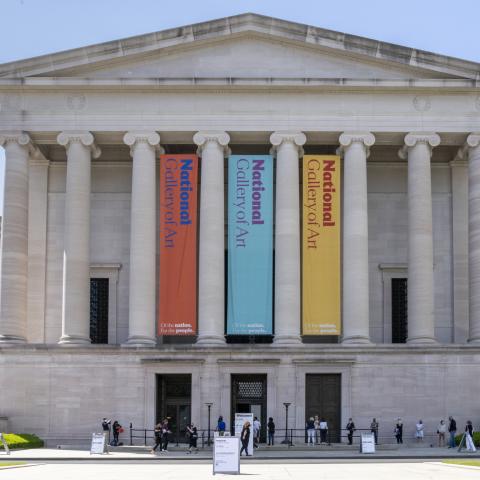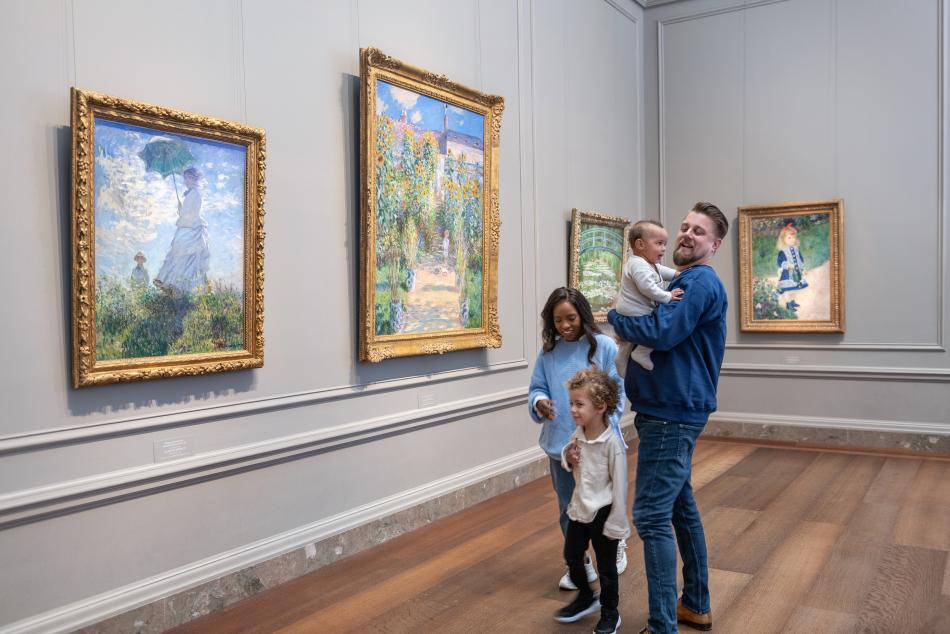Head Resting on One Hand, Bust
1890s
Sculptor, French, 1834 - 1917
Artwork overview
-
Medium
plaster, on wooden base
-
Credit Line
-
Dimensions
overall without base: 12.4 x 18 x 16.3 cm (4 7/8 x 7 1/16 x 6 7/16 in.)
-
Accession
1999.79.40

West Building Ground Floor, Gallery G3
Artwork history & notes
Provenance
The artist [1834-1917]; his heirs;[1] Adrien-Aurélien Hébrard [1865-1937], Paris;[2] his daughter, Nelly Hébrard [1904-1985], Paris;[3] consigned 1955 to (M. Knoedler & Company, Inc., New York); purchased May 1956 by Paul Mellon, Upperville, Virginia; bequest 1999 to NGA.
[1] The artist's heirs were René De Gas, his last surviving brother, who lived in Paris, and the four (of seven) surviving children of his sister Marguerite, who had died in Argentina in 1895. (His other deceased sister Thérèse left no descendants.) Marguerite's children were: Jeanne Fevre, unmarried and acting on both her own behalf and as the representative of her sister, Madeleine Marie Pauline Fevre, a Carmelite nun; Henri Jean Auguste Marie Fevre, an industrialist who lived in Marseille; and Gabriel Edgar Eugène Fevre, an agent in Montevideo, Uruguay. See Anne Pingeot and Frank Horvat, Degas sculptures, Paris, 1991, and Anne Pingeot, "The casting of Degas' sculptures: Completing the story," Apollo (August 1995): 60-63.
[2] On 13 May 1918 a contract was signed between the artist's heirs and the Hébrard foundry authorizing the reproduction of Degas' sculptures in bronze. Of the approximately 150 statuettes found in the artist's studio after his death, 74 figures were ultimately cast in bronze. The contract stipulated that two complete sets were to be cast, one for the heirs and one for the foundry, and authorized a limit of twenty casts of each figure to be offered for sale. The casting process took at least thirteen years, from 1919 to 1932, and according to the contract, the original figures became the property of the foundry. See Sara Campbell, "Degas' bronzes: Introduction," Apollo (August 1995): 6-10.
[3] The article by Anne Pingeot referenced in note 1 provides details of the role of Hébrard's daughter in the history of the foundry, and its work in casting the bronzes.
Associated Names
Exhibition History
1955
Edgar Degas 1834-1917: Original Wax Sculptures, M. Knoedler & Company, Inc., New York, 1955, no. 28.
1956
Sculpture by Degas, Virginia Museum of Fine Arts, Richmond, 1956.
1974
Nineteenth-Century Sculpture, National Gallery of Art, Washington, D.C., 1974, unnumbered checklist.
Bibliography
1956
Rewald, John. Degas Sculpture: The Complete Works. Translated by John Coleman and Noel Moulton. New York, 1956: no. XXIX.
1976
Millard, Charles W. The Sculpture of Edgar Degas. Princeton, 1976: 11-12, 108, 109, 111, fig. 121.
1988
Boggs, Jean Sutherland, et al. Degas. Exh. cat. Galeries nationales du Grand Palais, Paris; Musée des beaux-arts du Canada, Ottawa; and The Metropolitan Museum of Art, New York, 1988: no. 276.
1991
Pingeot, Anne. Degas Sculptures. Paris, 1991: no. 71.
1995
Campbell, Sara. "A Catalogue of Degas' Bronzes." Apollo 142 (August 1995): 10-48, no. 62.
Reff, Theodore. "The Morbid Content of Degas' Sculpture." Apollo (1995): 68.
2002
Czestochowski, Joseph S., and Anne Pingeot. Degas--Sculptures. Catalogue Raisonné of the Bronzes. Memphis, 2002: 243.
2009
Campbell, Sara, et al. Degas in the Norton Simon Museum: Nineteenth-Century Art. New Haven, 2009: 216-217, fig. 2.
2010
Lindsay, Suzanne Glover, Daphne S. Barbour, and Shelley G. Sturman. Edgar Degas Sculpture. The Collections of the National Gallery of Art Systematic Catalogue. Washington, D.C., 2010: no. 63, 350-355, color repro.
Wikidata ID
Q63861748


